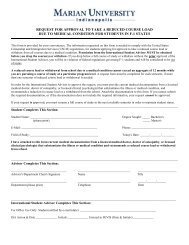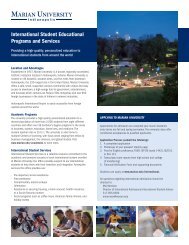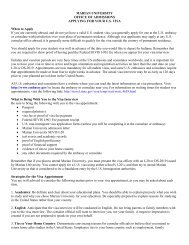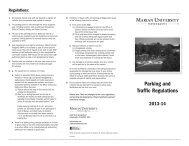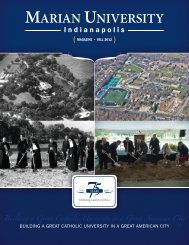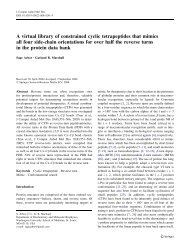2009-11 Marian University Course Catalog, fall 2010 edition
2009-11 Marian University Course Catalog, fall 2010 edition
2009-11 Marian University Course Catalog, fall 2010 edition
Create successful ePaper yourself
Turn your PDF publications into a flip-book with our unique Google optimized e-Paper software.
environment that impact our everyday lives. Three hours<br />
lecture and three hours lab each week. (2SE)<br />
BIO 330<br />
Histology 4 credits<br />
Prerequisite: BIO 201, 202, 203, and 204. The microscopic<br />
and ultramicroscopic investigation of tissues, including<br />
identification of tissues using light microscopy and the study<br />
of ultrastructure using electron micrographs. Three lecture<br />
hours and three lab hours per week. (ADD)<br />
BIO 334<br />
Human Medical Physiology 5 credits<br />
Prerequisite: BIO 201, 202, 203, and 204. This content of this<br />
course will provide a full description of all the essential<br />
aspects of human physiology. The depth of this course is<br />
designed to prepare students for the integrative physiology<br />
normal presented in veterinary, dental, or medical school or<br />
for what would be expected of any graduate student studying<br />
physiology. Four hours of lecture and one three-hour<br />
laboratory period per week. (FAL)<br />
BIO 340<br />
General Microbiology 4 credits<br />
Prerequisite: Completion of BIO 201,202, 203, and 204. A<br />
general study of bacteria and related microorganisms;<br />
including metabolism, genetics, economic importance, as well<br />
as infectious diseases and the immune system. Three lecture<br />
hours and three lab hours per week. (2SE)<br />
BIO 345<br />
Immunology 3 credits<br />
Prerequisite: BIO 201, 202, 203, and 204. A study of the<br />
vertebrate immune system and its relationship to disease and<br />
disease resistance. Three lecture hours. (2SO)<br />
BIO 350<br />
Developmental Biology 4 credits<br />
Prerequisite: BIO 201,202, 203, and 204. A study of the<br />
development in higher organisms, including molecular<br />
processes and morphogenesis. Three lecture hours and three<br />
lab hours per week. (ADD)<br />
BIO 355<br />
Environmental Science and Policy 4 credits<br />
Prerequisites: 201, 202, 203, 204. Students explore the<br />
history and characteristics of modern environmental law in<br />
the U.S. The course covers the Clean Air Act, Clean Water Act,<br />
solid and hazardous waste management, the Endangered<br />
Species Act, and the National Environmental Policy Act.<br />
Students also gain experience in phase one and two<br />
environmental assessment, and other environmental science<br />
techniques. Three hours lecture and three hours lab each<br />
week. (2SE)<br />
BIO 360<br />
Junior Internship 1-3 credits<br />
The junior internship in biology permits students with junior<br />
standing to earn academic credit for work or volunteer<br />
activity that deals with the biological sciences or prepares the<br />
student for graduate and or professional school. The<br />
internship is designed to integrate classroom knowledge with<br />
practical work experience in the student’s chosen area of<br />
study. Students are evaluated by their on-the-job supervisor<br />
and by their monitoring faculty member. Students also<br />
present both a written and oral summation of their<br />
experience. A minimum of four hours of actual work<br />
experience per week, or 60 hours during the semester, is<br />
required for each credit to be earned. Enrollment in the<br />
course is arranged after review and approval of the proposed<br />
internship by program faculty. This course may be repeated<br />
for an accumulated total of six credits. Three credits earned<br />
in this course may count towards the credits required for the<br />
biology major, with any additional credits earned applied<br />
towards the total 60 credits of science required for the<br />
bachelor of science degree. (ADD)<br />
BIO 361<br />
Introductory Field Biology I 3 credits<br />
Prerequisite: BIO 201,202, 203, and 204. A beginning field<br />
experience, combined with lecture and laboratory time. Ten<br />
days on campus and at a field station. Study of flora and<br />
fauna of Southern Indiana woodland, field, and waters.<br />
Emphasis on land studies. (SUM)<br />
BIO 362<br />
Introductory Field Biology II 3 credits<br />
Prerequisite: BIO 201,202, 203, and 204. A continuation of<br />
BIO 361, with the emphasis on water studies. (SUM)<br />
BIO 370<br />
Evolution 3 credits<br />
Prerequisite: BIO 201,202, 203, and 204. This course<br />
examines the biological underpinnings of evolutionary theory,<br />
including mechanisms of evolution, speciation, phylogeny<br />
reconstruction, and evidences. It then explores the effect of<br />
Darwin’s theory on a wide range of disciplines, including<br />
language, art, literature, history, theology, political science,<br />
and sociology. (2FE)<br />
BIO 372<br />
Invertebrate Biology 3 credits<br />
Prerequisite: Completion of BIO 201, 202, 203, and 204. This<br />
course is designed to present students with the diversity of<br />
invertebrate life with an emphasis on the developmental<br />
biology of invertebrates, their major body plans, evolutionary<br />
interrelationships, and ecology. The overlying theme of the<br />
presentations will be: 1) the structure and function of each<br />
system; and 2) to place every topic into a framework of<br />
evolutionary adaptive significance. Three hours of lecture and<br />
one three-hour laboratory period per week. (ADD)<br />
74




